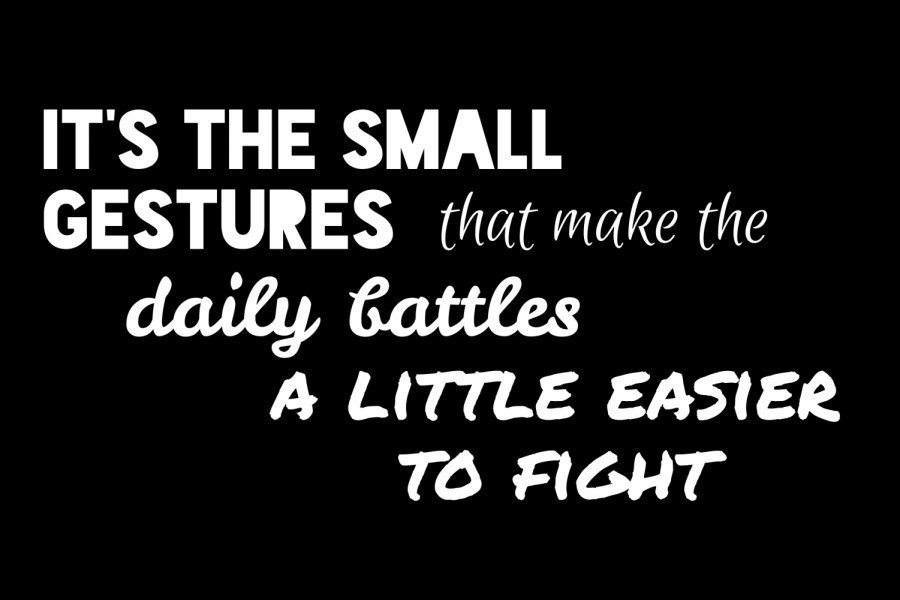Small acts make a big difference in mental health
When it comes to helping a friend with mental health issues, don’t discount little actions.
February 24, 2020
My heart drops every time I hear the PA system come on at school. I get nauseous at the sound of sirens at night. I can’t listen to “Party in the USA” without being flooded with memories. Some days I can’t even walk down certain hallways without feeling like something, or someone, is missing.
Two years ago, the Whitman community lost then-sophomore Jojo Greenberg to suicide. Jojo was the libero for the JV volleyball team, vice president of the Animal Rights Club, an aspiring yoga instructor, a member of the cheer team and my friend. She was outgoing, kind, everybody’s friend and had the biggest smile. We played volleyball together my freshman year, and I couldn’t have asked for a more supportive teammate and friend. I thought she was the happiest person I’d ever met. I had no idea that behind her laughter, she was battling depression.
Looking back on my memories of her, I remember that she spent every day making everyone around her smile. During volleyball practice, we used to run laps around the school, and we dreaded it. One day Jojo decided to bring her speaker with us when we ran our laps. For the rest of the season, we ran around the school, screaming Taylor Swift lyrics at the top of our lungs, out of breath from running and laughing at the same time.
I’ve also had my own experiences with mental illness and watched people close to me go through their own struggles; I know what it’s like to be known as the “happy friend” who’s always okay. I know that the reality of being that person isn’t always what it seems. Pictures never tell the whole story, smiles are easy to fake and people’s lives are never as easy as they look. How happy someone looks on any given day has little to no correlation with the state of their inner world — and we should remember this in each interaction with each other.
It’s the small gestures that make the daily battles a little easier to fight. A compliment can change the trajectory of someone’s day. Check with old friends to see how they’re doing. Help someone with their homework. Hold the door open for a stranger. Think twice before making a joke at someone else’s expense. Let go of an old grudge and try to make amends. Do favors when people ask. Try and get to know the people in your class who you’ve never talked to before. Think about the people, not just the names, in the fallout of the rumor before you spread it. Be a shoulder to cry on, a hand to hold and a listening ear. Show appreciation to those who have had your back.
Simple acts of kindness not only benefit those around you but can also benefit the good Samaritan’s health as well. Researchers have discovered the brain’s capacity for a “helpers high.” After performing an act of kindness, the brain releases the neurotransmitter dopamine, which leaves people feeling calmer, more energetic and more confident. This effect has been proven prominent among adolescents; studies have shown that teenagers who regularly volunteer have lower levels of anxiety and depression and are less likely to fail a subject in school, get pregnant or abuse substances. Studies have also shown that being kind reduces pain, stress, anxiety, depression and blood pressure.
As a school, we’ve been taking steps in the right direction in terms of the big picture — the mental health awareness seminars bring attention to conditions and treatments available. They start a necessary conversation about the role we play in our peers’ health and in our own. It’s time to bring that conversation into our everyday lives. The seminars can’t teach empathy in 45 minutes; that responsibility falls on us. Remember that nobody expects you to be perfect. Nobody expects grand gestures regularly. But motivation to spread a little kindness every day isn’t difficult to achieve.
I am so grateful for the people in my life who do what they can to make it better, even in small ways. At the end of the day, the classes you take, the grades you get and the activities you participate in don’t define you. You are the sum of your actions and your impact.
National Random Acts of Kindness week is this week. It’s a great opportunity to take the time to focus on how you can be a better person and work toward a better community.
After Jojo died, everyone started calling her sunshine; she truly was a light in everyone’s life. Despite everything going on, she still managed to have the biggest heart and have a positive impact on everyone around her.
Be someone’s sunshine.







